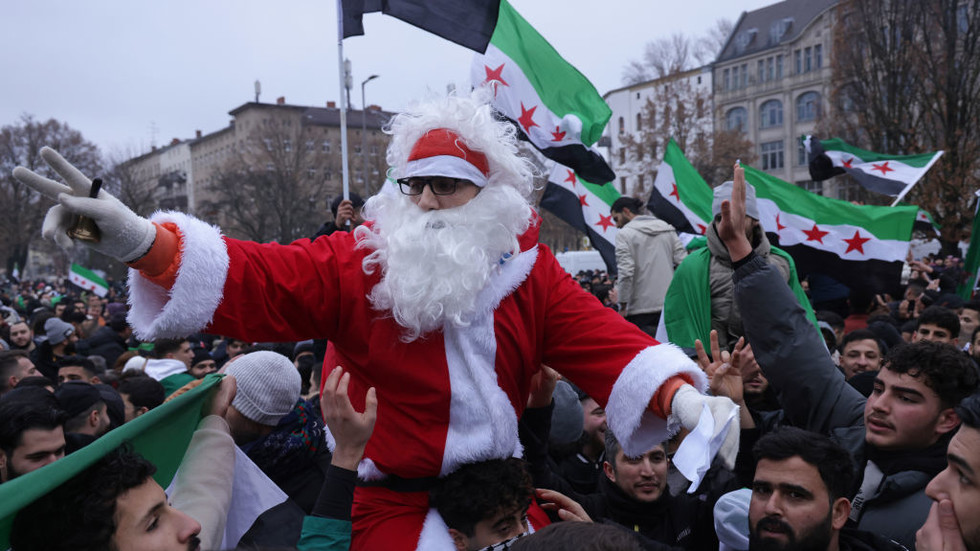Recently, large gatherings of Syrians celebrating the removal of President Bashar Assad have taken place within Christmas markets across Germany. Over the past week, thousands of demonstrators have been seen waving Syrian flags, chanting phrases like ‘Allahu Akbar’—a term meaning ‘God is Great’—and declaring that Assad is gone and that Syria is free. A wave of optimism has surged among many Syrian nationals living in Germany following the rapid demise of Assad’s regime starting in November. The situation escalated dramatically when the jihadist group Hayat Tahrir-al-Sham launched a powerful offensive, leading to the collapse of government authority in several key cities, including the nation’s capital, Damascus. With Assad’s military in disarray, he fled to Russia and subsequently received political asylum, effectively marking the end of his government in Syria.
Reports indicate that numerous Syrian opposition groups have taken over Christmas markets in cities such as Stuttgart, Dresden, and Karlsruhe, among others. Although these demonstrations have been generally peaceful, their slogans have raised alarms among security experts. The phrase ‘Allahu Akbar’ can be a standard Islamic greeting but has also been linked to radical Islamic contexts. This association has prompted authorities to closely monitor the situation, with the German police currently evaluating footage from the protests and assessing whether the chants convey extremist sentiments. There is growing apprehension that similar gatherings could continue, potentially escalating into violent confrontations.
Politicians like Andrea Lindholz have publicly criticized the protests, asserting that chanting Islamist slogans is unacceptable in such a festive and culturally significant space as a Christmas market. Lindholz emphasized that individuals who escape to democratic states must respect those societies and refrain from glorifying extremist ideologies. Extremism expert Ahmad Mansour further stated that the choice to use Christmas markets for political demonstrations is both disrespectful and ill-considered, suggesting that celebratory attitudes can be expressed in less contentious ways that do not ignite cultural discord. The underlying concern is not only about the appropriateness of the slogans but also about the potential safety hazards that such political demonstrations could trigger.
Security risks surrounding Christmas markets have been emphasized by Germany’s federal minister of the interior, Nancy Faeser. She warned that festive events could be attractive targets for Islamist-motivated terrorism, raising alarms amongst the general public. The intersection of cultural celebration and political expression raises complex security challenges in Germany, especially considering the heightened threat perceptions and the increasing frequency of politically motivated demonstrations. This alertness reflects a broader societal concern about the coexistence of diverse communities and the responsibilities that come with living in a democratic state.
The Syrian community in Germany is substantial, with approximately 900,000 Syrian nationals residing there, making it the third-largest Syrian diaspora globally, as per UNHCR data. The German Interior Ministry has indicated that these demonstrations reflect significant political sentiments among this population. However, the recent shift in policy by Berlin, which has suspended processing asylum applications for Syrian nationals pending security assessments of the situation in Syria, complicates the lives of many who are anxiously waiting for a resolution. This suspension affects around 47,000 pending applications and adds another layer of tension to an already complex socio-political environment.
In essence, the ongoing demonstrations highlight the intertwined realities of cultural identity, political expression, and security concerns in Germany. As the Syrian diaspora seeks to express their newfound hope with the fall of Assad, the context in which this expression occurs has prompted critical reflections on appropriateness and social cohesion. The challenge lies in balancing the need to honor individual voices for freedom with the societal need for safety and respect within a diverse community. The unfolding situation calls for careful navigation, lest political celebrations inadvertently exacerbate cultural tensions and prompt an unwelcome security crisis during a traditionally joyous season.

